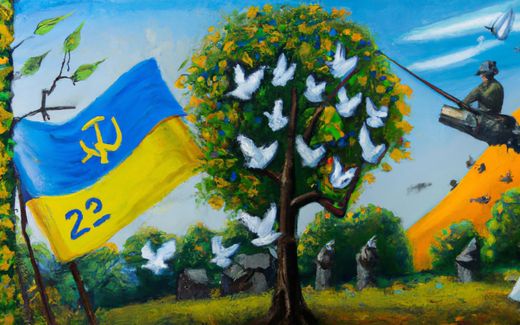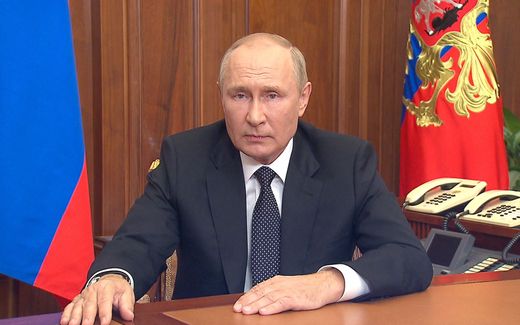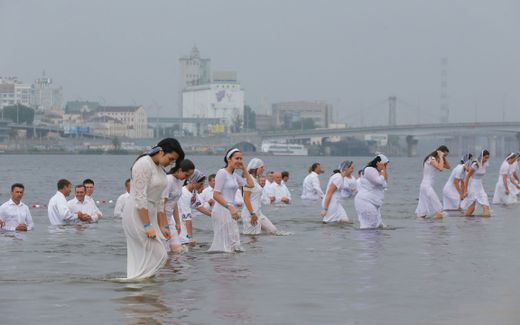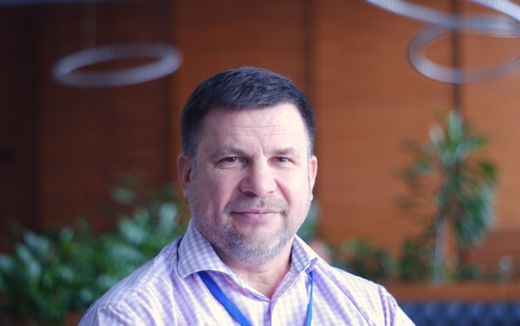Christian pacifist under the gun for Western involvement in Ukraine
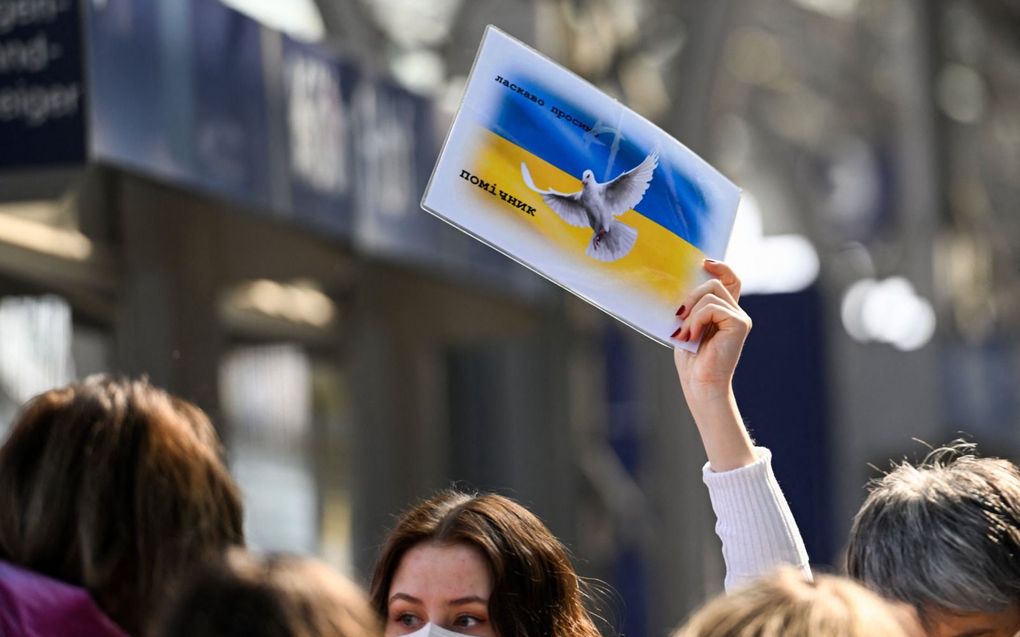
The war in Ukraine puts pressure on the Christian peace movement. "What is more important? Loving your enemies or standing in solidarity with Ukraine?" Photo AFP, Ina Fassbender
Central Europe
Germans followed a simple principle after World War II: Nie wieder (Never again). Many of them became pacifists and refused conscription. The war in Ukraine puts pressure on the Christian peace movement. "What is more important? Loving your enemies or standing in solidarity with Ukraine?"
A few weeks before the Russian invasion, Germany donates 5,000 helmets to Ukraine. While Berlin speaks of a "clear signal", Kyiv mocks. Vitali Klitschko, mayor of the Ukrainian capital, calls the donation a joke. "What will Germany send next? Pillows?"
Shortly after the invasion, everything is different; when the German government decides to invest 100 billion euros in its armed forces, Chancellor Scholz speaks of a turning point in history. A year after the donation of helmets, Germany supplies Ukraine with tanks, cannons and anti-aircraft guns.

For Mennonite peace theologian Fernando Enns, a professor at the Free University in Amsterdam and the University of Hamburg, Scholz's message came as a surprise. "From the beginning of the war, Germany took sides in a hot war. That was a 180-degree turn from what it had been doing in recent decades."
According to Enns, one of the reasons for the sudden policy change is fear: "In wars that happened far away, Germany stuck to its pacifist stance. But now that the battle is near, Germany chooses differently." In addition, according to the professor, shame plays a role. "Despite Russia having been at war with Ukraine for eight years, Germany continued to trade with the Russians and remained dependent on Russian gas. Now it quickly wants to choose the other side."
Identity
The two world wars in the 20th century made pacifism part of German identity. The nuclear threat that gripped the divided country during the Cold War added to this. Because of these strong influences, Germany avoided involvement in the Iraq war in 2003. Historically, mainly the left wing of the political spectrum demonstrated against (nuclear) weapons. In churches in both West and East Germany, Christian pacifism gained great support.
The German government's sudden turn following the Russian invasion of Ukraine, therefore, causes tumult in German churches. The war divides the Evangelical Church of Germany (EKD); the majority sides with President Annette Kurschus who supports arms supplies. A small minority remains vehemently opposed to all forms of arms support. The figurehead of that faction is EKD peace commissioner Friedrich Kramer.
Last November, Kramer, bishop of the Church Province of Central Germany, opens the EKD Synod with a sermon. He uses that podium to reiterate his message of non-violence. With half of Germany's defence investment -50 billion-, Germany would eliminate hunger from the world, he tells his audience. He is also clear about German arms supplies: "I say no." According to a journalist from the Frankfurter Allgemeine Zeitung, this stance causes annoyed looks from leading EKD clerics.
Fundamentalists
Prof Enns sees three movements within Christian pacifism: fundamentalists, who reject any form of war; atomic pacifists, who are especially opposed to nuclear weapons; and pragmatic pacifists, who are against war in principle but want to judge each conflict individually. Mennonite Enns places himself in the latter group.
The Hamburg professor opposes arms supplies, although he fully understands the Ukrainian defence struggle. "Legally and morally, what the Russian government is doing is completely wrong," he says. Enns looks to his fellow Mennonites in Ukraine to define his own position on this war. "The general secretary of the Mennonite Ukrainian Church says that the church has other tasks than participating in warfare, such as providing medical care and sheltering people. As Christians, we need to think carefully about what our role in this war is."

Bishop Friedrich Kramer served as a construction soldier in East Germany. Although he did not carry a weapon, he is not necessarily against arms supplies. "Because of the Budapest Memorandum (in which Russia, the United States and Britain provide security guarantees to Ukraine, LN), it makes sense for the US and the UK to supply weapons. But I am looking from the German context. And a country that has the promotion of peace in its constitution should not supply weapons."
Kramer is disappointed with the German government's decision to invest 100 billion in the armed forces. "Why should we Germans want the largest army in Europe? That will not reassure our neighbours; they have experienced that before."
Bleeding heart
According to Kramer, most people within the EKD avoid the term pacifism. "It is not something you say publicly because the term is ridiculed, and it sometimes comes across as a bit remote," he says. Yet, according to him, the majority of clergy within the church are conscientious objectors or former participants in anti-nuclear weapons demonstrations.
According to the Bishop, this signifies that pacifism has not gone away. "It is all because of the war in Ukraine and setting priorities: what is more important? Loving your enemies or being in solidarity with Ukraine?"
Despite the fierce discussions, it is possible to have a dialogue within the EKD on these issues, Kramer says. President Kurschus calls criticism of arms supplies an "inevitable and absolutely necessary polyphony". Nevertheless, she believes that "most people of our church have been forced to support the supply of arms, even with a bleeding heart and strong reservations."
Black and white
Peace theologian Enns, however, thinks that supplying weapons only worsens the war. According to him, the narrative of the war is too black and white. "It's the bad Russians against the good Ukrainians. But there will never be peace if we remain stuck in that binary thinking. That is why we must stop these narratives in Russia and the West. If our main goal is to protect the Ukrainian people from violence, then we must also do everything we can to protect Russian soldiers. They are fathers, sons and brothers as well."
Thus, supplying arms by the West is the wrong move, says Enns. "The economic sanctions packages made big headlines but were only used when they did not hurt our economies. People can criticise pacifism, but who are they to say that lives are spared by arms supplies when they are not willing to suffer economic pain to save lives?"

According to the Brazilian-born Enns, Scholz can take an example from Brazilian President Lula. Despite German insistence, the recently installed president refused to supply arms because "Brazil is a country of peace," suggesting an international peace initiative.
According to Enns, the solution to the Ukrainian conflict, therefore, lies outside Europe. "People in South America, Asia and Africa look at the West with amazement," he said. "The Western path seems to have no exit strategy." According to Enns, support for Putin outside Europe is small, but Europe is not a neutral party. "Therefore, large neutral countries like Brazil, South Africa and India will have to act as peacemakers."
Bishop Kramer sees a bleak future in Ukraine. "I think little will change in the coming period. The war could continue for another two years, resulting in thousands of deaths." Regarding the German debate surrounding the war, he is more positive. "The discussions are becoming more factual, and pacifist thinking seems to be taken more seriously." Kramer is positively surprised by the support from unexpected quarters. "Pacifists today increasingly see themselves supported by leading military figures. They too fear escalation due to ever-increasing arms supplies."
Arguments over arms deliveries

Whereas Bishop Kramer sticks to his pacifist views, Bishop Christian Stäblein supports arms supplies. The pair entered the conversation in a German church magazine.
Berlin Bishop Christian Stäblein supports German arms supplies to Ukraine, albeit with pain in his heart. In a column in the Berliner Zeitung, Stäblein shares his reservations, which show a transition from the old pacifism to a new vision. "It is historically depressing that after 80 years, we are again providing tanks capable of fighting in this part of Europe. Yet it is not Christian to leave people to themselves and their attackers."
In the church magazine "Mein Glaube. Meine Heimat", EKD peace commissioner Kramer discussed the arms deliveries with Stäblein. "Ukraine's ability to defend itself does not depend on German weapons," he said.
Still, Stäblein thinks Kramer should reconsider his position in the current situation. "What would happen to Ukraine without European support? (...) We have to reckon with it: Putin and his fighters are ruthless. Russia still intends to destroy the Ukrainian state."
Kramer backs up his position with historical grounds. "The war in Ukraine has been going on for eight years. Germany has supplied 300 million euros worth of weapons in those eight years to Russia. This is an evil war, and the question is how we, as Germany, participate in it."
For Kramer, it is clear: "I expect Germany to make proposals in the UN Security Council to end the violence as soon as possible by, for example, creating a demilitarised corridor, manned if possible by non-European blue helmets.
Kramer and Stäblein find each other in the power of prayer. Kramer: "This is my deepest conviction: 'if anyone can end wars, it is God." Stäblein: "This is also my conviction. I trust that He will lead us to peace."
A dead pacifist
Norwegian theologian Olav Valen-Sendstad (1904-1963) was a staunch pacifist until the Germans invaded his country in 1940. "In one night, the pacifist in me died. It has been dead ever since."
The talked-about Valen-Sendstad released a pamphlet describing his journey in 1952. In "Kan en kristen være soldat?" (Can a Christian be a soldier?), the Norwegian explains that Christian pacifism can only be based on the Bible. For Valen-Sendstad, it was the words in Matthew that convinced him: "But I say to you, do not resist the one who is evil. But if anyone slaps you on the right cheek, turn to him the other also." (Matthew 5:39)

Yet he radically changed his mind when Nazi Germany invaded Norway on 9 April 1940. At the time, Valen-Sendstad was a priest and civil servant in a village near southwestern Stavanger. Early in the morning, Valen-Sendstad received a phone call informing him that the Germans had occupied Stavanger. The theologian immediately went into prayer. While he was doing so, the pacifist in him died, Valen-Sendstad said. "And he has been dead ever since." In the choice between his oath to serve the country and his pacifist beliefs, the pacifist lost.
In the pamphlet, Valen-Sendstad argues that no one can be a pacifist when it comes down to it. As long as there is no test like 'April 9th', it is easy to remain a pacifist.
Since Valen-Sendstad's 'April 9th', he has been convinced that a Christian must act in the words of Nehemiah. "Those who carried burdens were loaded in such a way that each laboured on the work with one hand and held his weapon with the other" (Nehemiah 4:17).
Related Articles


